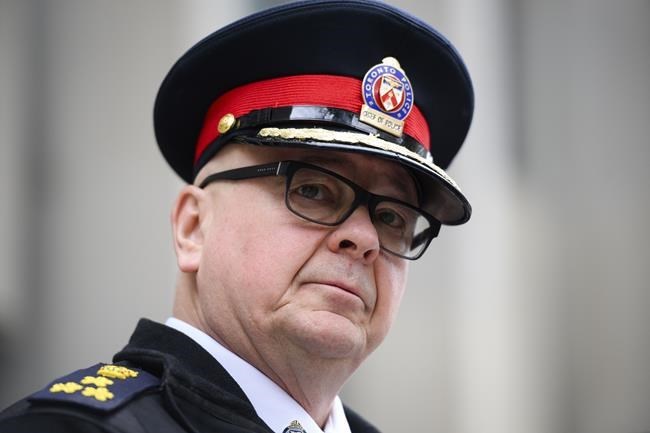Toronto's police chief has yet to apologize for the doubt he cast on a man's innocence when commenting on his acquittal, the Canadian Civil Liberties Association said Thursday as it asked the civilian body overseeing the force whether it thinks the chief's comments were appropriate.
The CCLA said it has also asked the Toronto Police Service Board what steps it will take to ensure Chief Myron Demkiw and other police force members don't "publicly malign bail decisions or criminal verdicts in the future."
The association's questions to the board came after Demkiw said on Sunday that police "were hoping for a different outcome" after a jury acquitted Umar Zameer in the death of an officer.
On Tuesday, the chief then said he wanted to be "crystal clear" he accepts and supports the jury's verdict, but the CCLA said he had not "specifically repudiated or apologized" for his initial comment.
"Chief Demkiw’s statement conveyed to the public that despite Mr. Zameer’s acquittal, he should have been found guilty," CCLA wrote in its letter.
"His statement cast doubt on Mr. Zameer’s innocence, usurped the judicial system’s responsibility to determine guilt, and undermined public confidence in the administration of justice."
Toronto's police service board did not immediately respond to a request for a comment on the CCLA's letter.
Asked about the letter, Toronto Police Service spokeswoman Stephanie Sayer said the chief "has stated numerous times that he supports the justice system and accepts the decision of the jury."
"He again acknowledged that we all seek closure to tragic events in different ways, but that closure does not come at the expense of justice. We have nothing further to add on this," she said.
A jury found Zameer not guilty of first-degree murder on Sunday afternoon in the death of Det. Const. Jeffrey Northrup, who was run over by a vehicle in Toronto City Hall's underground parking garage nearly three years ago.
Zameer told the trial he didn’t know Northrup and his partner – who were in plain clothes – were police officers and Zameer felt he, his pregnant wife, and their young son were in danger when two strangers ran up to his car.
During trial, prosecutors alleged Zameer chose to drive dangerously even though Northrup and his partner were nearby, and alleged Zameer intentionally ran down Northrup.
Defence lawyers argued Zameer didn't know they were officers and feared his family was under attack from robbers or a gang. They argued Zameer had no reason to want to flee police, and tried to escape as safely as he could.
On Tuesday, when pressed about his weekend comments, Demkiw said "in the context of the totality of the circumstances" he was trying to convey that he accepted the jury's findings.
Shakir Rahim, director of CCLA's Criminal Justice Program, and Noa Mendelsohn Aviv, CCLA's executive director and general counsel, said in the letter that the chief's statement demands review and oversight.
"It is well outside the scope of the police’s official duties to publicly malign an acquittal delivered after a trial, where relevant evidence against an accused person has been heard and tested," the letter said.
Legal observers have questioned the decision to charge and prosecute Zameer for murder when the evidence did not support it.
Comments on the case made by several politicians, including Ontario Premier Doug Ford before the trial even began, were also criticized by observers.
When Zameer was released on bail in the fall of 2021, Ford expressed his disapproval on X, formerly known as Twitter, calling the decision "completely unacceptable." He initially described Zameer as "the person responsible for this heinous crime," but later changed it to "the person charged."
Ford said earlier this week that he had "limited information" at the time. He made similar comments on Thursday, saying he made his comment with the information he "had at the beginning."
"It's a very sad situation," he said.
This report by The Canadian Press was first published April 25, 2024.
Fakiha Baig, The Canadian Press




